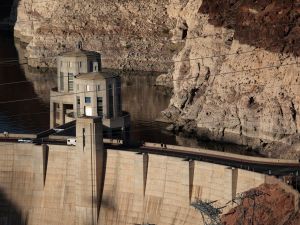Are there inherent limitations to coordinated regulations that promote carbon reduction? Hurd and Hurd make a convincing argument as to why such regulations are needed and, more importantly, how we should proceed in effecting system-wide change. But even a comprehensive overhaul can only accomplish so much.
Chapter 19.12 of the Las Vegas Zoning Code and conservations measures established by the Las Vegas Valley Water District apply and enforce strict regulations with the intention of reducing average household water usage. These include a prohibition on new turf in the front yards of single-family homes, limitations on the frequency of car washing for personal vehicles, and the enforcement of a mandatory watering schedule, among many others.
While these measures have clearly succeeded in reducing water usage, the fact remains that the Vegas Valley, and the Southwest in general, continues to experience more and more serious water shortfalls. In fact, Lake Mead, the largest reservoir in the United States that stores nearly all of Las Vegas’ usable water, is dropping by an average of one foot per day, with federal officials stating that usage of Colorado River water, in general, has surpassed supply (http://desert.sn/ThFpIa).
How useful, then, are these largely successful water conservation measures in Las Vegas if they fail to address larger issues related to population growth in a desert area with access to limited (and falling) supply? While the Great Recession slowed that growth in Las Vegas, construction is picking back up. Is this dependence on growth a topic politicians in Las Vegas will ever be willing to broach prior to some catastrophic event? Are conservation measures, then, simply a crutch that allows us to feel like we’re doing something, whether or not that something is sufficient?


The followings are my thoughts on your topic.
Talk about piecemeal regulations, the longevity and effect of this rebates-and-coupon scheme is questionable.
http://www.lvvwd.com/conservation/ws_rebates.html
And talk about inconsistent applications, some can actually get away with simple applications.
http://www.lvvwd.com/conservation/drought_measures_fountains.html
Even if some did violate the rules, how will the water waste fees really going to hurt those who are making tens of thousands dollars a day? (i.e. the casinos and hotels with big fountains)
http://www.lvvwd.com/conservation/waste_fees.html